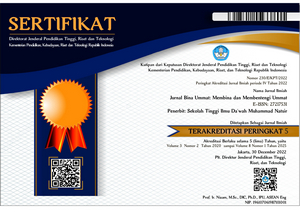FEMINISM: THREATS TO FAMILY RESILIENCE IN INDONESIA
DOI:
https://doi.org/10.38214/jurnaldawahstidnatsir.v7i1.238Keywords:
AILA Indonesia; Family resilience; Feminism.Abstract
This research looks at how AILA Indonesia resisted attacks from feminists who were thought to be attacking the core of the Indonesian family. To collect data, interviews, periodic observations, and documentation studies were carried out within seven months. In the meantime, the data was analyzed through a communication strategy and da'wah strategy approach. The general chairman, secretary general, head of the field of research, and two discussion participants were all interviewed in person. The findings from this research indicate that this alliance has struggled to take a bina’an (defensive) and difa'an (offensive) approach. Defensively, they approach the community through regular educational programs, in the form of Focus Group Discussions (FGD), Training for Trainers (TFT), and seminars which are supported by published writings in the form of articles and books. During this time, the offensive approach was carried out by submitting a Judicial Review (JR), criticizing several articles that were seen to be meaninglessly biased, and persistently speaking opinions by bringing specialists to the Rapar Dengar Pendapat (RDP) in the constitutional court. The information gathered also revealed that the tactic employed was a common-sense approach that involved inviting the audience to tafakkur, ta'ammul, and tadabbur to the principles put forth by the feminists. This study has significance for the government's or religious institutions' efforts to increase family resilience in Indonesia through new sustainable techniques and innovation.
Published
How to Cite
Issue
Section
Copyright (c) 2024 Jurnal Da'wah: Risalah Merintis, Da'wah Melanjutkan

This work is licensed under a Creative Commons Attribution 4.0 International License.
This work is licensed under a Lisensi Creative Commons Atribusi 4.0 Internasional.
Authors who publish with this journal agree to the following terms:
- Authors retain copyright and grant the journal right of first publication with the work simultaneously licensed under a Creative Commons Attribution License that allows others to share the work with an acknowledgment of the work's authorship and initial publication in this journal.
- Authors are able to enter into separate, additional contractual arrangements for the non-exclusive distribution of the journal's published version of the work (e.g., post it to an institutional repository or publish it in a book), with an acknowledgment of its initial publication in this journal.
- Authors are permitted and encouraged to post their work online (e.g., in institutional repositories or on their website) prior to and during the submission process, as it can lead to productive exchanges, as well as earlier and greater citation of published work (See The Effect of Open Access).




